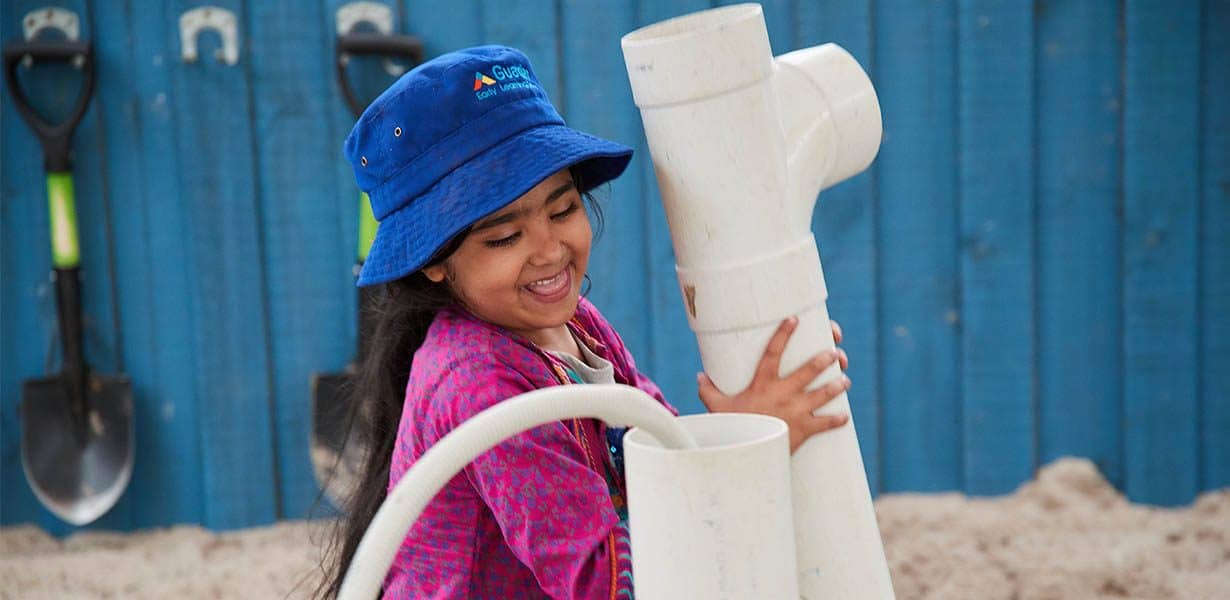Preparing Children for School and Life

At Guardian, we believe setting the foundations for future success at school and beyond starts with a child who is confident and aware of our ever changing and globally connected world.
Each child offers a world of wonder, questions and exploration. Our educators are skilled at evolving this exploration and discovery to encourage 21st Century skills, including science, numeracy, literacy, and creative thinking.
Recently Dr Elanna Yalow, Chief Academic Officer of Early Learning Programs of Kindercare, has outlined a few important aspects of early education to aid understanding about language and literacy, play based learning, gender identity and our curriculum. We’ve taken some time to deconstruct each of these theories and relate them to your child’s early learning experiences.
School readiness
From the first day of care, we prepare children for formal schooling and beyond.
We encourage children to explore learnings in multi-age settings, to give things a go, reflect and discuss possibilities with others and consider how and why an idea, project or exploration can change in the future. Each child’s eventual readiness for school remains considered and is actively promoted throughout all educational programs.
Hear from Dr Elanna Yalow on our curriculum and our approach to early education.
Language and literacy: skills for the future
As you know, the first three years is a critical time for language development. Basic language communication skills can assist forming a linkage with cultural heritage, future work and life opportunities and assists in aiding each child’s internal executive function. This executive function is the “conscious” control of thoughts, actions or emotions and encourages self regulation of the mind. This betters working memory, inhibitory control and cognitive flexibility.
Dual language exposure helps children remember information, filter distractions, reflect before acting and adjust to changing demands. Dr Elanna Yalow discusses the benefits of dual language exposure.
Encouraging creativity and innovation
Children express their thoughts and ideas through drawing, writing, sculpture, painting, drama, music, singing, movement and scientific enquiry. How a child approaches a new task, new experience or problem can be expressed in many different ways. This is when we see creative and innovative thinking evolve.
Play is the context of a child’s learning. It supports the development of attention, memory, reasoning , imagination, creativity, emotional development, impulse control and the ability to take another’s perspective. Learn about the importance of play based learning.
Supporting critical thinking and problem solving
At Guardian, we nurture the joy of discovery.
Through our educational programs, children become deep thinkers and active enquirers. Children may observe and borrow their problem solving approaches and begin to adapt these based on what they have summarised, observed or analysed.
Our educators intentionally create learning environments that support critical thinking and problem solving skills by planning and providing opportunities for children to engage in different social, cognitive and practical experiences.
Here, Dr Elanna Yalow outlines the importance on nurturing individuality and identity through experiences.
Understanding digital technology
When used appropriately, technology can help children explore the world, help them make meaning and sense of what they know, think and want to share with others. Learn about the importance and limitations of screen time.
Why this is important
The professions children pursue, may not exist yet. As our world becomes more complex and globally interconnected, we acknowledge that children need to think creatively, work collaboratively and solve problems by thinking in increasingly innovative ways.
Strong communication and social skills, the confidence to take initiative and flexibility to change are all important skills for the future. It’s these skills that support children in their lives.
Children are supported to ask questions, volunteer and share their thinking, work collaboratively and develop the skills they will need for their next formal stage of learning. Respect, confidence, persistence and resilience are recognised in the sphere of skills needed in the 21st Century, being supportive of children’s success in both school and life.
All of these skills are fostered during a child’s day with us.
Looking for the right Childcare Centre for your Family?
Submit your details and a member of our Concierge Team will be in touch to discuss what you need and how we can help you experience something more than childcare.
We'll be in touch soon.





